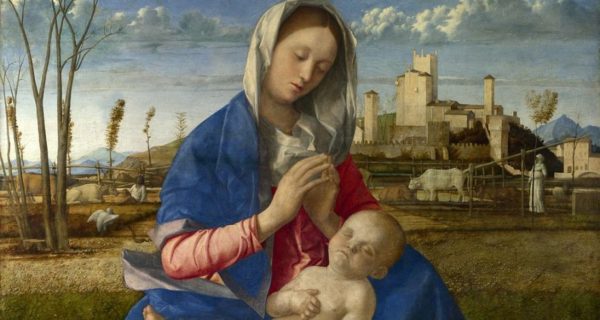I used to dislike the song “Mary, Did You Know?”, as a lot of Catholics tend to, taking it rather literally, and there are still a few points of theology I might quibble over. But I’ve come around to seeing the poignancy at the heart of it. It’s an extremely deep examination of Christian theological claims about the divinity, and humanity, of Jesus Christ, and the “shock factor” of it all. All worthwhile Christmas carols contain this.
Of course, Mary “knew” in the sense that the angel told her the basics of what was about to happen, but then again, it’s clear she didn’t know everything. It must have all been quite an overwhelming mystery to her, unfolding a little at a time, because she “pondered all these things in her heart.” Also, it’s supposed to be rhetorical poetry to get *us* to ponder the mystery, and in that sense, it’s actually strikingly beautiful.
Perhaps the point, here, is that Mary’s purity is not based in how much she “knew”, but rather how much she trusted in the Lord’s plan, and how much she was willing to be an instrument for that plan to be brought into effect. This is a pretty sound rebuke to some variations of intellectualism that creeps into religion, where philosophical gymnastics is sometimes given too much pride of place.
This is not to say philosophy is not important, but sometimes our efforts to explain things to our satisfaction is beyond us, and we must “surrender” our own need to connect the dots and simply be present to that mystery of the divine indwelling. This is Mary’s character to a tee. She is all about surrender, submission, and waiting in the silence of the heart for the manifestation of a mystery that grows in her womb.
This is the meaning of Advent, and it’s what makes Mary embody it. It’s the all-vulnerable time when silent prayer is the only adequate response to God pouring Himself out and making Himself small for us. It is not always comfort and joy right away, but rather a sense of bafflement and fear. Mary’s purity does not shield her from this, but if anything it makes her more sensitive to it, and this quality also makes her sensitive to the love story she has become.
St. Maximillian Kolbe wrote: “What kind of union is this? It is above all interior; it is the union of her very being with the being of the Holy Spirit. The Holy Spirit dwells in her, lives in her, from the first instant of her existence, and he will do so always, throughout eternity. In what does this life of the Spirit in Mary consist? He himself is uncreated Love in her; the Love of the Father and of the Son, the Love by which God loves himself, the very love of the Most Holy Trinity. He is a fruitful Love, a ‘Conception.'”
Love, they say, is blind. Perhaps there is some kernel of truth in this. Love if it is of the truest kind must ascribe to a deeper reason than reason knows. We must sometimes rely on a deeper sight than the merely physical variety. Lovers weave their “stories” in the darkness of the night. God weaves His salvation for Mankind in the darkness of a womb. And this depth of darkness will foreshadow the tomb, and contain at its heart the Mystery of the Faith.
It is the Christian way to ponder the “strangeness” of our own claims. We have long relished it, the subversion of it all. That’s what makes Christmas carols powerful, eternal in nature. They are not supposed to calm us as much as challenge us, possibly even shatter us, at any season in which we listen to them. Even the softest lullay of a lullaby is murmuring a type of holy insanity, baby language to the Word of God.
And so, Mary delivers a Child who shall deliver all Mankind from the snares of the ancient enemy, who will bring back life to those dead in sin; she kisses the cheek of her baby, cold in the night air, and so kisses the Face of God. Who might do this and live? In the Old Testament, men could not look upon God and live! They could see only the “back” of Him, but here, now, we see His face, in a little child doomed to die! What insanity is this? How “ungodly” this God of ours has become!
Caryll Houselander reflected, “Working, eating, sleeping, she was forming His body from hers. His flesh and blood. From her humanity she gave Him His humanity. Walking in the streets of Nazareth to do her shopping, to visit her friends, she set His feet on the path of Jerusalem. Washing, weaving, kneading, sweeping, her hands prepared His hands for the nails. Every beat of her heart gave Him His heart to love with, His heart to be broken by love. All her experience of the world about her was gathered to Christ growing in her.”
That is the gift the Virgin Mary gives us: Herself, and through Herself, like the clearest of glass with light piercing through, she gives us Her Son. And this she does, though she does not have all the answers, though she walks by faith and not by sight. She does so in all her humanity, and humility, as such is the heroine of the salvific saga, ideal of the human race. And so, her name lives on in story and in song, and all generations have come to call her blessed.
